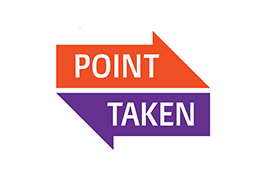April 26, 2016
4/26: Weighing the Value of a College Education
Point Taken/Marist National Poll
A majority of Americans, including parents with children under 18 years of age, think college is worth the price tag, and many consider a college education to be important for both future earning potential and personal growth and experience, according to an Exclusive Point Taken-Marist Poll, commissioned by WGBH Boston for its new late-night, multi-platform PBS debate series Point Taken. However, three in four U.S. residents consider the cost of a college education to be out of reach for most American families.
 The national survey was conducted by The Marist Poll in advance of this week’s Point Taken episode, airing Tuesday, April 26, 2016 at 11:30pmET (check local listings) and streaming on pbs.org/pointtaken. The series is hosted by Carlos Watson, Emmy Award winning journalist and OZY Media co-founder and CEO.
The national survey was conducted by The Marist Poll in advance of this week’s Point Taken episode, airing Tuesday, April 26, 2016 at 11:30pmET (check local listings) and streaming on pbs.org/pointtaken. The series is hosted by Carlos Watson, Emmy Award winning journalist and OZY Media co-founder and CEO.
 55% of Americans, including 51% of parents, think college is worth the cost, and more than three in four Americans consider college education to be essential. In fact, 77% of residents perceive a college degree to be key to future success, and the same proportion thinks the need for a college degree equals the importance of a high school diploma for an earlier generation. Similar proportions of parents share these views.
55% of Americans, including 51% of parents, think college is worth the cost, and more than three in four Americans consider college education to be essential. In fact, 77% of residents perceive a college degree to be key to future success, and the same proportion thinks the need for a college degree equals the importance of a high school diploma for an earlier generation. Similar proportions of parents share these views.
Not surprisingly, Americans with a four-year college degree, 68%, are more likely than those without such a degree, 47%, to report that a college education is worth the price tag. Those with a degree, 88%, as well as those who earn $50,000 or more annually, 81%, are also more likely than those without a degree, 70%, or those who earn less than $50,000, 73%, to consider a college education to be key to future success. Gender differences are also present. Women, 61%, are more likely than men, 49%, to say college is worth the price tag.
“While there are concerns about the cost, Americans still see the value of a college education,” says Dr. Lee M. Miringoff, Director of The Marist College Institute for Public Opinion.
“For decades, a college education has been viewed as a ladder to success,” says Denise DiIanni, series creator and Executive-in-Charge. “And this week’s Point Taken will delve into the data, the perceptions and realities of its value.
Six in ten Americans, 60%, believe that, without a college degree, jobs are limited. Non-white residents, 67%, are more likely than white residents, 56%, to report jobs are limited for those without a college degree. Americans who receive an annual salary of $50,000 or more, 42%, are more likely than those who make less, 32%, to disagree.
Americans do divide, however, about whether learning a trade or skill provides greater earning potential, 42%, than receiving a college education, 46%. Men, 47%, are more likely than women, 37%, to think that learning a trade or skill allows a person to earn more money than going to college. Generationally, millennials, 32%, are less likely than older generations to have this view.
Aside from the financial benefits of a college education, more than two-thirds of Americans, including 70% of parents, report the personal growth and experience of a college education is worth the cost. Here, too, residents with a college degree, 74%, and women, 72%, are more likely than those without a four-year education, 62%, and men, 61%, to have this view. Millennials, 73%, are more likely than Baby Boomers, 62%, and members of the Silent-Greatest Generation, 60%, to say the growth and experience of a college education is worth the price tag.
Looking at the overall impact of a college education, 78% of Americans with a four-year degree report their life would be worse if they did not have that degree. While a plurality of residents without a four-year college degree, 48%, say their life would be no different if they had that education, 44% say it would be better, and only 4% report it would be worse.
While many Americans perceive a college education to be a worthwhile investment, three in four residents, 75%, think the cost of a college degree is out of reach for most American families. However, millennials, 30%, are more likely than their older counterparts to believe the cost of a college education is within reach. Still, 67% of millennials report the cost of a college degree is out of reach for most Americans.
However, 65% of Americans, including the same proportion of parents, say college is worth the financial risk, despite the amount of debt students will take on, because of the future earnings potential and career opportunities. Again, residents with a college degree, 75%, and women, 71%, are more likely than those without a degree, 58%, and men, 58%, to have this view. Millennials, 72%, are more likely than those in the Silent-Greatest generation, 58%, to report the cost of college is worth the financial risk.
Complete April 26, 2016 USA Exclusive Point Taken – Marist Poll Release
Complete April 26, 2016 USA Exclusive Point Taken – Marist Poll Banners (Banner 1: Gender, Race, Age, Education, Income)
Complete April 26, 2016 USA Exclusive Point Taken – Marist Poll Banners (Banner 2: Generation, Party ID, Ideology)
Marist Poll Methodology
Marist Poll Nature of the Sample and Complete Tables

